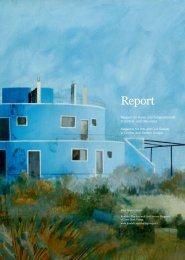Report_Issue 1/2009 - Jubiläum/ 20 Jahre Mauerfall
Report_Issue 1/2009 - Jubiläum/ 20 Jahre Mauerfall
Report_Issue 1/2009 - Jubiläum/ 20 Jahre Mauerfall
Sie wollen auch ein ePaper? Erhöhen Sie die Reichweite Ihrer Titel.
YUMPU macht aus Druck-PDFs automatisch weboptimierte ePaper, die Google liebt.
the<br />
Manuela Hötzl: In the process of analysing a<br />
linguistic term your book also describes the<br />
mood in Europe at present. From your point of<br />
view, what questions does the language problem<br />
in Europe raise?<br />
Boris Buden: The main question in my book is<br />
about the future of Europe. One of my theses is<br />
that there is no European language per se, and<br />
that none of the national European languages<br />
can take over this role. But how can a Europe,<br />
which wants to unify, communicate in future?<br />
What common language – which is necessary,<br />
if Europe wants to be truly democratic – should<br />
the European public speak? The language of<br />
Europe can only be understood as a kind of<br />
translation practice, a linguistic communication<br />
that takes place as a process of constant<br />
reciprocal translation. At present there is no<br />
real awareness of this challenge. But in the future<br />
neither intellectuals nor politicians will be<br />
able to avoid this problem.<br />
In the course of your search for the “true goal<br />
of translations” you also look for the “lost social<br />
emancipation”. Could this be the “new<br />
ideological start of Europe” that Slavoj Žižek<br />
writes about on the flyleaf to your book?<br />
The main thesis of my book is that in our postmodern<br />
era all spheres of social life but above<br />
all the political one are translated into culture,<br />
or, if you prefer, into the language of culture.<br />
Today culture has become a kind of ultimate<br />
translation. We can no longer manage to escape<br />
the all-embracing notion of culture. This<br />
is the point where it must become clear that,<br />
unlike what some people believe, we cannot<br />
expect global emancipation through cultural<br />
translation alone. The “new beginning”, which<br />
Žižek calls for, means nothing less than a repoliticisation<br />
of our historical experience and<br />
the economic sphere. The first step towards<br />
this new beginning is the recognition that there<br />
is also experience lying outside of the field of<br />
culture and that this experience can only be<br />
made as a result of practical change. Previously<br />
this change was called revolution, but today we<br />
have to reinvent it.<br />
Do you believe that a Europe which wishes to<br />
define itself through a common cultural identity<br />
is on the wrong track?<br />
Of course Europe is on the wrong track if it<br />
believes that cultural development alone can<br />
decide its destiny. This belief is even very dangerous,<br />
as it makes us blind to political contradictions<br />
and the new, as yet unknown, antagonisms<br />
that the project of European unification<br />
will inevitably bring with it. My book is directed<br />
precisely against this political blindness. Or,<br />
to put it more precisely, against the naïve belief<br />
in a new cultural identity, an identity that is<br />
supposed to develop outside of the old concept<br />
of the European nations' fundamental identities,<br />
as a kind of “cultural hybridism”. This is<br />
supposed to spare us giving an answer to the<br />
equally decisive question about Europe's future,<br />
i.e. whether Europe should develop into<br />
a kind of federal nation state. Sooner or later<br />
the sovereignty of the existing nation states<br />
will have to be abolished, or, contrariwise, Europe<br />
must try out a completely different form<br />
of democracy.<br />
“Even if we don’t talk and<br />
understand languages perfectly,<br />
we should use them<br />
and savour the taste of them<br />
in our mouths.”<br />
What form of democracy might that be?<br />
It could be something that refers back to the<br />
tradition of the European revolutions or, to be<br />
more precise, to the experiences of the revolutionary<br />
soviet republics.<br />
But surely the German soviet republics quickly<br />
collapsed due to constant internal disagreement?<br />
I myself don't feel so badly in this kind of perennial<br />
dispute – out of which my book too developed.<br />
But, to put joking aside: what we are<br />
talking about here is a different experience of<br />
democracy, an alternative concept of democracy.<br />
Just as my own cultural identity, if I have<br />
one, no longer fits into the conceptual framework<br />
of a national culture. But precisely this<br />
can no longer be translated into the political<br />
realm and there is, as yet, no democracy outside<br />
of the nation state. In this area I am both<br />
politically and culturally a nobody, a wageearner,<br />
whose rights are far fewer than those<br />
of the working classes a hundred years ago, I<br />
am, as a Croatian nationalist once said about<br />
a nation without a state, “like a piece of shit in<br />
the rain”.<br />
How did you personally experience the changes<br />
in Croatia?<br />
Croatia is today still dreaming of its area of<br />
cultural sovereignty and is consequently working<br />
towards the self-isolation of its culture. Although<br />
the Croatians have essentially the same<br />
language as the Serbs and the Bosnians they<br />
are attempting to radically distinguish their<br />
version from the other two. This means that<br />
they are doing their own language untold damage.<br />
The consequence of this linguistic autism<br />
is a situation reminiscent of the position in the<br />
19th century, when Croatia was still part of the<br />
einventing<br />
Boris Buden, the author of the book “Der Schacht von Babel – Ist Kultur<br />
übersetzbar” (The Pit of Babel – is Culture Translatable?) , explains in<br />
the conversation with „<strong>Report</strong>“ why he finds the belief in a new cultural<br />
identity naive and why society should not confuse politics with culture.<br />
Buden speaks of Europe as a translation community.<br />
— Manuela Hötzl in conversation with Boris Buden —<br />
evolution<br />
Habsburg monarchy. At that time most of the<br />
elite studied in Vienna and spoke German, the<br />
language of knowledge, intellectual communication<br />
and sophisticated culture. The mass of<br />
the people had to make do with their completely<br />
autistic native tongue, Croatian, which was<br />
incapable of serious cultural and intellectual<br />
production.<br />
Has German been replaced by a new “language<br />
of the elite”?<br />
The language of the elite nowadays is English.<br />
This elite studies abroad, mostly at American<br />
or British university faculties, where intellectual<br />
communication takes place primarily in<br />
English.<br />
Could English not take over the role of a common<br />
European language?<br />
The French philosopher Etienne Balibar has<br />
pointed out that English is “more or less” the<br />
European language. But English is also the<br />
language of global communication and exists<br />
in many different forms. On the other hand<br />
English is the language of only two of the European<br />
nations. Why should this language in<br />
particular take on the role of the language of<br />
Europe?<br />
You take as your starting point Wilhelm von<br />
Humboldt's understanding of language, which<br />
ultimately defines a nation exclusively in terms<br />
of language. Have the Eastern and South-eastern<br />
European countries perhaps too readily<br />
adopted this concept?<br />
The idea of a homology between language and<br />
culture, which ultimately implies that there can<br />
be no European culture per se, or that European<br />
culture is only a kind of summation of European<br />
national cultures, is based on Humboldt's<br />
understanding of language as a self-contained<br />
totality and the expression of a self-contained<br />
community. The nations of Eastern and Southeastern<br />
Europe also experienced the romantic<br />
phase of nation building, mostly in the 19th<br />
century. This happened although most of them<br />
did not immediately succeed in crowning this<br />
cultural “revival” with the founding of their<br />
own nation state. If their aim today is to bring<br />
this process to its final conclusion by political<br />
means, then this seems a kind of anachronism<br />
Does the same kind of thing happen in the<br />
West?<br />
Here one has only to think of all the institutions<br />
of so-called national culture that still<br />
continue to enjoy official support, both in Eastern<br />
and Western Europe, and which dominate<br />
cultural life in the whole of Europe. Therefore<br />
institutionally European culture and the educational<br />
systems of the European peoples (that<br />
are based on national languages) still remain<br />
at the same stage of development as in the 19th<br />
century.<br />
More and more countries, including Austria,<br />
are compelling foreigners to learn the language<br />
of the country they live in. Do you think this is<br />
right?<br />
This kind of compulsion is contra-productive.<br />
And furthermore it is motivated by the same<br />
conservative historical perspective, i.e., the<br />
conviction that national culture forms the ultimate<br />
horizon of modern culture and whoever<br />
doesn't possess it is without culture or primitive.<br />
Etienne Balibar, whom I referred to earlier,<br />
believed that the future of European culture<br />
lies with those people who have gone beyond<br />
the horizon of national culture.<br />
What translation methods do you think should<br />
be used in the EU?<br />
I can't answer this question. But one thing<br />
should be emphasised: translation is increasingly<br />
more than a merely linguistic process. It<br />
is always also a cultural, political and social examination<br />
of what is foreign. As I see it the socalled<br />
linguistic or literary translation is only a<br />
part of “translation practice”.<br />
In the future ought all of us speak more languages?<br />
Yes, even if we don’t talk and understand them<br />
perfectly, we should use them and savour the<br />
taste of them in our mouths.<br />
Boris Buden, who was born in Croatia in 1958, studied<br />
classic and modern philosophy in Klagenfurt, Zagreb<br />
and Ljubljana. Since 1984 he has worked as a freelance<br />
journalist and writer. Buden regularly publishes<br />
philosophical and political essays as well as cultural<br />
criticism in German, English and French. While an activist<br />
in the Croatian peace movement he founded the<br />
journal “arkzin” in 1993.<br />
Boris Buden, “Der Schacht von Babel – Ist Kultur übersetzbar?”,<br />
Kulturverlag Kadmos, Berlin <strong>20</strong>04<br />
Boris Buden/Stefan Nowotny, „Übersetzung: das Versprechen<br />
eines Begriffs“, Turia + Kant, Vienna <strong>20</strong>08<br />
The unabridged interview was published in “<strong>Report</strong>”<br />
1/<strong>20</strong>05<br />
65




